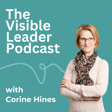
The Secret to Showing Vulnerability Without Losing Your Credibility
Dr Katharina Schmidt completed an executive MBA at Kellogg Business School and then for the next 20 years had an international career with various professional services firms before she started her own business as an Executive Coach & Leadership Team Developer.
She’s lived all over the world and speaks 5 languages fluently. And she had a career as a professional volleyball player!
We talked about Confidence and Vulnerability – and how to show both as a leader to build trust in your team.
We covered:
- The link between vulnerability and psychological safety
- The right balance between confidence and vulnerability
- What being a vulnerable leader actually sounds like
- How imposter syndrome fits into the picture of confidence and vulnerability
- What experiments you can try that will encourage you (and everyone around you) to be more vulnerable and build trust
Find out more about Dr Katharina Schmidt: https://www.inspirationanddiscipline.com
Read more of her articles: https://www.forbes.com/sites/forbescoachescouncil/people/katharinaschmidt1/
And connect with her:
https://www.linkedin.com/in/dr-katharina-schmidt-psyd-343612/
